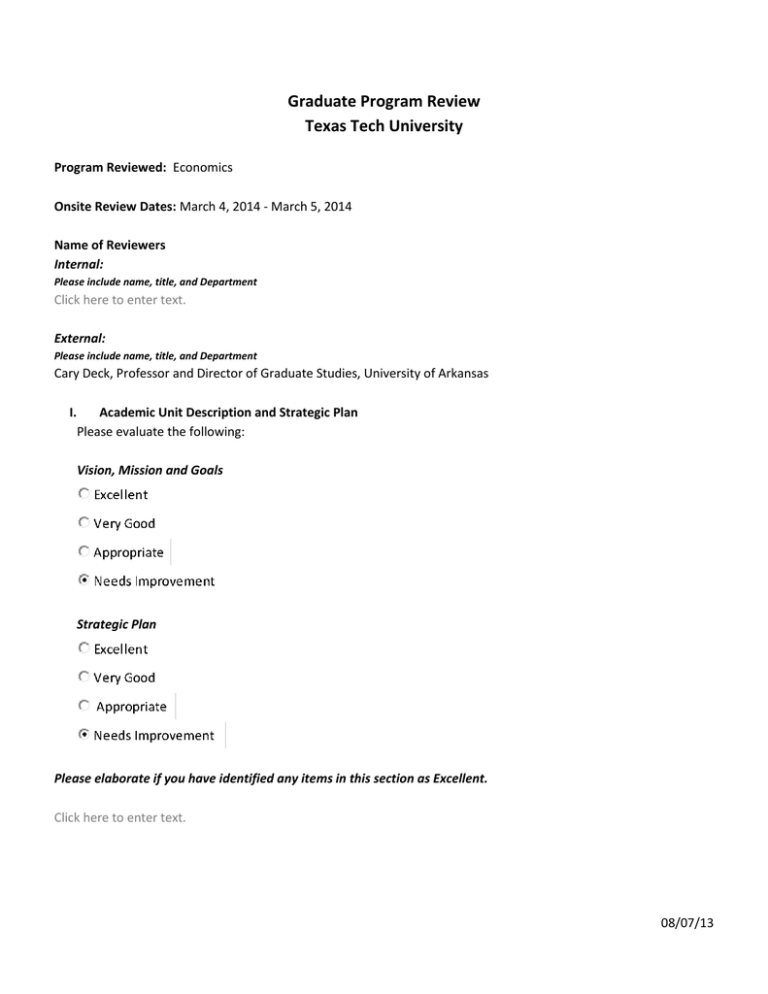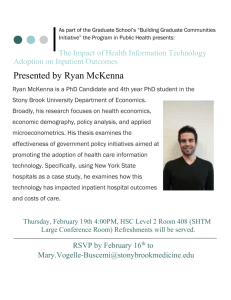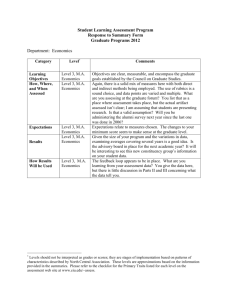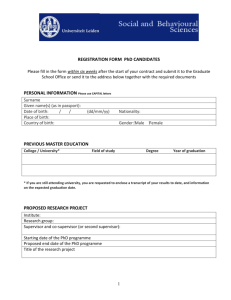Graduate Program Review Texas Tech University
advertisement

Graduate Program Review Texas Tech University Program Reviewed: Economics Onsite Review Dates: March 4, 2014 - March 5, 2014 Name of Reviewers Internal: Please include name, title, and Department Click here to enter text. External: Please include name, title, and Department Cary Deck, Professor and Director of Graduate Studies, University of Arkansas I. Academic Unit Description and Strategic Plan Please evaluate the following: Vision, Mission and Goals Strategic Plan Please elaborate if you have identified any items in this section as Excellent. Click here to enter text. 08/07/13 Please elaborate if you identified any items in this section as Needs Improvement. Provide recommendations in the area of Strategic Planning. The department lacks a coherent vision as to what it can or should be. The actual mission statement is very generic. Rather the department appears to be simply in a reactive mode simply following along what it has done previously. For its faculty and graduate student size, the department should attempt to identify a few areas in which it wants to develop core strengths that guide hiring and graduate student training. Currently the department offers six fields on a semi-regular basis, but does not have a depth of expertise in any of them meaning that students take whatever fields happen to be offered and do not receive a robust training. It is especially troubling that the junior faculty, many of whom have the potential to produce quality research are not connected to the department in terms of direction. It appears that many of these problems stem from a complete lack of research focused full professors to provide leadership. Other comments (optional) Click here to enter text. II. Program Curriculum Please evaluate the following: Alignment of program with stated program and institutional goals and purposes Curriculum development coordination and delivery Program learning outcomes assessment 08/07/13 Program curriculum compared to peer programs Please elaborate if you have identified any items in this section as Excellent. Click here to enter text. Please elaborate if you identified any items in this section as Needs Improvement. Provide recommendations in the area of Program Curriculum. There is a lack of structure to the graduate curriculum. PhD field courses are offered on an irregular basis so students do not know when they will be offered and what fields they can take. MA students take two required classes and then take electives from the PhD requirements and field courses. This means that courses often have third year PhD students and MA students together limiting either the MA students’ ability to perform or weakening the benefit of the course to the PhD students. The level of rigor in some classes is questionable, some of which may be due to the overlap in student backgrounds in courses but it is not clear that the math preparation required for admission is sufficient for a PhD program either. A more standard approach in the discipline is to have a regular class sequence where MA and first year PhD students take a fixed core. The class sequence should include at least two econometrics courses. Currently, the program has a single econometrics class, which is problematic given that most of the students are going to be engaged in empirical research. One solution is to encourage students to take offerings in other departments, but first best would be to develop a second course in the department that is focused on the needs of the students. It would benefit the program and students for students to take four classes per term rather than three. This would enable comprehensive exams to be given during the summer. Offering the comps during the summer avoids the problem of comps distracting students from course work and the burden placed on students who are teaching while preparing for comps. Taking an additional course per term should also enable students to complete course work 08/07/13 faster so that they can more quickly move into the research phase of a PhD. The number of courses required for the PhD and MA seem large. Finally, the lack of specialization in a department of this size means that fields are individual faculty member specific. This means that students are likely not receiving a robust training within a field. This also creates problems for graduate students in terms of comp exams and dissertation advising given the large junior faculty turnover. Other comments (optional) Click here to enter text. III. Faculty Productivity Please evaluate the following: Qualifications Publications Teaching Load 08/07/13 External Grants Teaching Evaluations Professional Service Community Service Please elaborate if you have identified any items in this section as Excellent. Click here to enter text. 08/07/13 Please elaborate if you identified any items in this section as Needs Improvement. Provide recommendations in the area of Faculty Productivity. Click here to enter text. Other comments (optional) The research output of the tenured faculty is low in terms of both quality and quantity. While this may be a legacy of the past structure of the department administration and a lack of full professors, it has large detrimental effects on the reputation of the department which makes attracting quality faculty and placing graduates difficult. The lack of a research reputation is reflected in minimal professional service such as editorial posts or refereeing. The recently hired untenured faculty show promise, but need and deserve research mentoring if they are expected to perform at the appropriate level. IV. Students and Graduates Please evaluate the following: Time to degree Retention Graduate rates 08/07/13 Enrollment Demographics Number of degrees conferred annually Support Services 08/07/13 Job Placement Student/ Faculty Ratio Please elaborate if you have identified any items in this section as Excellent. Click here to enter text. Please elaborate if you identified any items in this section as Needs Improvement. Provide recommendations in the area of Students and Graduates. The program should take two steps to help with graduate student success in moving through the program effectively. First, it should develop a more standardized and focused curriculum (as discussed in Section II) and second, it should implement a more rigorous screening process for admissions. The growth in the program has made the student to faculty ratio very high. The effect of this ratio is potentially even more dramatic than in other departments because the burden of supervising these students will fall on the research active junior faculty and this will hamper the ability of the junior faculty to develop professionally, which is critical to any future success of the department. Given its resources and productivity, the department has actually done a very good job in placing students. Other comments (optional) Click here to enter text. V. Facilities and Resources Please evaluate the following: Facilities 08/07/13 Facility Support Resources Financial Resources Staff Resources Please elaborate if you have identified any items in this section as Excellent. Click here to enter text. Please elaborate if you identified any items in this section as Needs Improvement. Provide recommendations in the area of Facilities and Resources. 08/07/13 Resource availability is mixed. In some dimensions (ex: travel, start-up packages) support seems reasonably good, but there are some key investments that need to be made to foster a research culture inf the department. First, there needs to be opportunities for students to work as research assistants for faculty. This is valuable for enabling faculty to be productive, but more importantly it provides critical professional training to graduate students that they do not receive in class. Second, a research department should have an active seminar series. Evidently other programs on campus are able to create a seminar course to access funds that can be used to support outside visitors for the exchange of ideas, which is again critical for the professional training of graduate students. Finally, access to standard software such as Matlab, SAS, Stata is not widely available to students and it needs to be. Other comments (optional) VI. Overall Ranking Overall Ranking Please provide summative conclusions based on the overall review. The economics department has only recently emerged as a self-determined unit. Despite this, the department has succeeded in increasing its graduate enrollment and has placed students well given the research profile of the faculty. The department is attempting to transition from a largely service oriented role within the university to a more research focused group. Recent faculty hires highlight the potential that exists for a stronger economics department at Texas Tech. However, the current vision of the department is fairly generic, most likely shaped by the department’s past experience and a lack of research prominent full professors to provide guidance. The faculty as a whole need to work together to develop a shared vision of what the department can and should become. While there has been clear progress that has occurred over the last few years, there remain several aspects of the program that need improvement. The ratio of graduate students to faculty is high. It is already placing a burden on junior faculty who are expected to supervise students while establishing their own research agendas. Growth in the program is not sustainable without an overhaul of the program that includes more support. If it is pursued, an adverse pattern will persist where desirable faculty pursue positions at other schools. 08/07/13 Please provide summative recommendations based on the overall review. I have two sets of recommendations. The first deals with specific procedural changes that would allow the graduate programs to be delivered in a more effective manner. The second deals with strategies for developing the type of economics department that a research university ought to have given the breadth of other programs that are touched by economics. Procedural: The graduate program should have a more uniform structure. The MA students should have a standard core in math, micro, macro, and econometrics plus a few electives. A second required econometrics course should be added to the curriculum. Fewer total fields should be offered in the PhD and the fields that are offered should be offered on a regular and dependable schedule. This type of system will help limit the diversity of backgrounds in a particular course and thus enable the faculty to teach the class at the appropriate level. Having fewer fields will enable the department to hire multiple people in the offered fields making the training more robust and less susceptible to personnel issues at any particular point in time. Students should be enabled to take appropriate electives from across campus. Establishing clear admission standards with respect to math training will also help ensure that courses are taught at the appropriate level. The number of classes that students take in the two programs can be reduced and students should take more classes per term. The direct benefits of this are that students finish coursework and transition to researcher sooner, which should reduce the total time that people are in the program, and the second benefit is that comp exams can be given outside the regular semester such as in the summer after the first year core. Additionally the department should consider a more standardized comprehensive exam that can be applied to both MA and PhD students, perhaps with differential standards for passing. The department needs to be able to engage students as research assistants. This should help increase faculty research output including publications and grant applications. It also has direct educational benefits for the students as a PhD is fundamentally a research degree. Perhaps this educational aspect of research training can be used to justify funds use of current teaching assistant funds for this purpose. The department should have a research seminar series where external faculty are brought to campus to present current research to faculty and graduate students. In addition to being a key aspect of training graduate students, it also helps to elevate the prominence of the department within the profession. Transformational: To transform the economics department, Texas Tech should consider hiring two or three research active, high profile full professors into the department. Short of this, the department will languish as a service department. It is not reasonable to expect the department to be of high caliber without the leadership of wellestablished people to guide both the department faculty and the graduate students. In its current state with no full professors, a single senior person is simply insufficient and having only one such professor runs its own risks in terms of department dynamics. Hiring multiple senior faculty in differeing fields will create more recognition in the profession, improve the department’s research profile, and lead to a more balanced department. Such senior faculty should be able to better shoulder the responsibility of advising and placing PhD students and also contribute to the institutional goals of seeking external funding. Before engaging in such a hiring process "economics" at Texas Tech needs to engage in a detailed strategic process. By "economics" I mean not only the economics department but other units at Texas Tech where there are expertise in economics and other complementary fields such as 08/07/13 agricultural economics, finance, etc. because and a strong economics department has direct benefits across a wide array of disciplines. Because of these synergies, an investment in new senior faculty should have a large return for the university, although it should be noted that such an investment would serve to bring Texas Tech up to the level of its peer schools. 08/07/13






